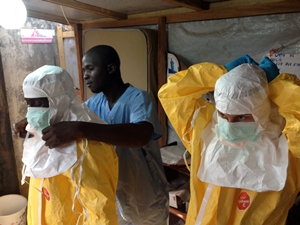28 August 2014. Early-stage clinical trials testing the safety of new vaccines to protect against the Ebola virus are scheduled to begin as early as next week at sites in the U.S., United Kingdom, Mali, and The Gambia in West Africa. The vaccines are being developed by National Institute of Allergy and Infectious Diseases (NIAID), part of National Institutes of Health in the U.S., and the pharmaceutical company GlaxoSmithKline in the U.K.
This year’s Ebola virus disease outbreak is one of the largest ever recorded and affects four countries in Africa: Guinea, Liberia, Sierra Leone, and Nigeria. The disease is caused by a virus spread through direct contact, often through broken skin or mucous membranes, with a sick person’s blood or bodily fluids, contaminated objects such as needles, and infected animals. Family and friends of people with Ebola and health care workers are among those most at risk, because of the higher probability of coming into contact with bodily fluids from a person with the disease.
Early symptoms of Ebola virus disease are fever, severe headache, muscle and abdominal pain, weakness, diarrhea, vomiting, and unexplained bruising or bleeding that quickly become more severe and often lead to death. The incubation period is 2 to 21 days. According to Centers for Disease Control and Prevention, more than 3,000 cases of Ebola are confirmed or suspected, resulting in 1,552 deaths. World Health Organization says the 47 percent survival rate of the current outbreak is higher than in previous Ebola outbreaks.
Two Ebola vaccines are being developed. One vaccine aims to protect against the Zaire strain of the virus, causing the current West Africa outbreak. The other vaccine is designed to protect against both the Zaire strain and a separate Sudan strain of Ebola.
The first clinical trials will test the vaccines with healthy adults, to reveal unforeseen side effects and to measure the immune response generated by the vaccine. The trial in the U.S. will test the vaccine developed by NIAID and GlaxoSmithKline developed for both Ebola strains. The parallel trial in the U.K., Mali, and the Gambia will test the vaccine covering only the Zaire strain. Later trials will test for the vaccine’s efficacy, in this case its ability to prevent the disease in a healthy individual.
The vaccine is made of tiny amount of Ebola genetic material designed to generate a single Ebola protein, which in turn provokes an immune response in the recipient, but not cause the recipient to contract the disease. NIAID and GlaxoSmithKline say preclinical studies conducted last year show the vaccine was able to protect against the Ebola virus in primates, while not causing adverse effects.
The trial in the U.S. will be conducted at National Institutes of Health. The U.K. study will be conducted by the Jenner Institute at University of Oxford, which will be followed by a trial in the Gambia. A parallel study in Mali will be conducted by University of Maryland and the Malian health ministry in Bamako, the capital city.
GlaxoSmithKline says funding for the trials will enable the company to manufacture some 10,000 additional doses of its vaccine while the trials are underway, should results show the vaccine is successful. The additional doses will be provided to World Health Organization for distribution in high-risk communities.
Read more:
- Early Trial Shows Parkinson’s Vaccine Creates Antibodies
- Dengue Vaccine Shown to Cut Infections, Hospitalizations
- Early Trial Shows Pneumonia Vaccine Safety, Immune Response
- MERS Vaccine Candidate Produces Immune Response in Lab Test
- Early Trial Finds Vaccine Booster Covers Pandemic Flu Types
* * *


 RSS - Posts
RSS - Posts
You must be logged in to post a comment.